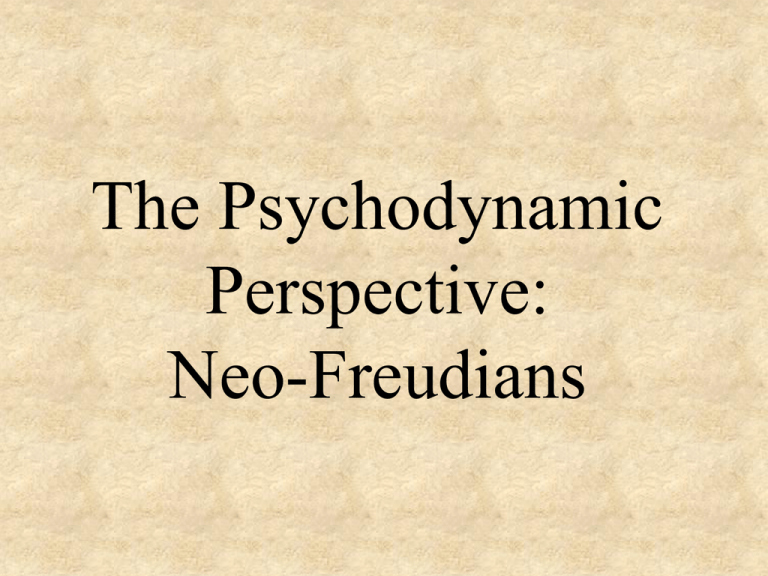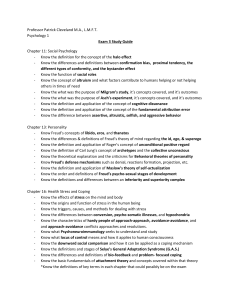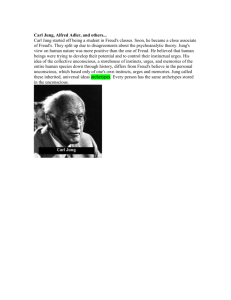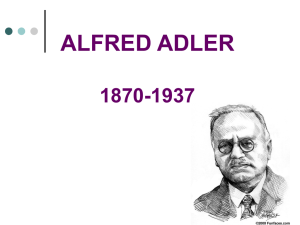The Psychodynamic Perspective: Neo
advertisement

The Psychodynamic Perspective: Neo-Freudians Neo-Freudians • Followers of Freud’s theories but developed theories of their own in areas where they disagreed with Freud • Disagreed with Freud in his belief that: 1. Behavior is motivated by sexual urges 2. Personality is formed by early childhood experiences 3. Human nature and society are inherently driven by sex and destruction. Post-Freudian Psychodynamic Theories The Neo-Freudians • • • • Carl Jung’s collective unconscious Karen Horney’s focus on security Erik Erikson focus social relationships Alfred Adler’s individual psychology Carl Jung (Yoong)(1875-1961) • Rejected Freud’s assertion that human behavior is directed by sex & aggression. •Believed that humans share a collective unconscious— concepts shared by all people across all cultures. - “The whole spiritual heritage of mankind’s evolution born anew in the brain structure of every individual.” •Archetypes – ideas and images of the accumulated experience of all human beings -powerful father, nurturing mother, witch, wise old man, innocent child, death & rebirth, etc… •These images are in our unconsciousness and influence our thoughts and feelings forming the foundation of our personality. Karen Horney (HORN-eye)(1885-1952) • Agreed with Freud that childhood experiences played a major role in development as an adult but thought that the greatest influence was social relationships not sexual ones. • Found psychoanalysis negatively biased against women. – Women didn’t have “penis envy” it was instead that they envied men’s superior status in society. – Instead said men have “womb envy” and compensate by making creative achievements in their work. Karen Horney • Looked at anxiety related to security and social relationships, especially parent-child relationships. • Basic anxiety— “the feeling of being isolated and helpless in a hostile world” – happens when not treated as you should be by parents • This will lead to hostility towards parents that is repressed. • Way to get healthy was to find genuine and consistent love. Alfred Adler (1870-1937) • Agreed with Freud on the importance of early childhood but thought social tensions were more important than sexual tensions • Believed psychological problems were the result of feelings of inferiority • Inferiority Complex - A condition that comes from being unable to compensate for normal inferiority feelings Alfred Adler • Most fundamental human motive is striving for superiority • Arises from universal feelings of inferiority that are experienced during childhood • People compensate for their weaknesses by emphasizing their talents and abilities or by working hard to improve themselves. • If unable to compensate or when feelings of inferiority are too great a inferiority complex can result where person feels inadequate, weak & helpless and are unable to try to improve. • If people overcompensate for their feelings of inferiority then they develop a superiority complex where one exaggerates achievements and importance to cover up their own limitations. Erik Erikson • Emphasized mother-infant relationship • Ego has more power than Freud believed – We have more decision making choices in our lives • Developed an 8 stage developmental theory of personality that dealt with different conflicts one faces as one grows up. – Example: Trust vs. Mistrust is the first conflict infants must overcome to be healthy. Evaluating & Updating Freud’s Psychoanalytic Theory Evaluation of Psychoanalysis • Evidence is inadequate— Freud’s data is developed from a small number of upper class patients or from self-analysis. – All of Freud’s data was from him so was he imposing his own ideas onto his patients or seeing only what he expected to see? • Theory is not testable—lack of operational definitions and no way to measure results. Good at explaining the past but not at prediction. – Many psychoanalytic concepts impossible to disprove because even contradictory information can be used to support Freud’s theory. • Sexism—believed that women were weak and inferior. Used male psychology as basis for all people – Said women were more vain, masochistic, and jealous than men and influence more by their emotions and had a lesser moral and ethical sense than men. Updating Freud’s Theory • Most psychodynamic psychologists agree: – Sex is not the basis of personality. – People do not “fixate” at various stages of development. – Much of a person’s mental life is unconscious. – Childhood experiences shape us socially and psychologically. – People struggle with inner conflicts and regulating their impulses, emotions and thoughts toward what society deems acceptable.







